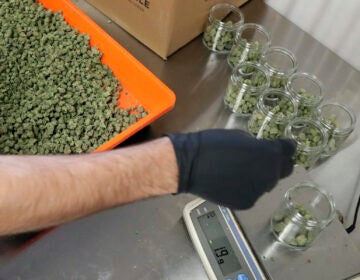Here’s what you need to know about Pa.’s marijuana laws
Medical marijuana was made legal in Pa. in 2016, but recreational sales elude the commonwealth. Here’s what you should know.
From Philly and the Pa. suburbs to South Jersey and Delaware, what would you like WHYY News to cover? Let us know!
In April 2016, Pennsylvania’s Medical Marijuana Act was signed into law by then-Gov. Tom Wolf, a Democrat. But it wasn’t until February 2018 that medical marijuana dispensaries began selling products to qualified patients.
During the first year, $57 million worth of medical marijuana products were sold to patients. Sales have steadily increased since then, surpassing $1.3 billion in 2021. Last year, medical marijuana dispensaries statewide sold $1.5 billion, and Pennsylvania on track to outpace that in 2024.
If legalized, recreational adult-use marijuana in Pennsylvania could generate between $400 million to $1 billion in new tax revenue for the state, according to the Pennsylvania Independent Fiscal Office.
The Medical Marijuana Act has been amended over the past eight years, including expanding the types of medical conditions that qualify, with the many changes passed in 2021.
“The medical marijuana program that we have right now is obviously much better than when it was passed in 2016,” said Jeff Riedy, head of the Lehigh Valley Chapter of the National Organization for the Reform of Marijuana Laws.
Industry advocates estimate about 4% of the adult population in Pennsylvania is already participating in the medical marijuana program.
“It’s a pretty robust program …[even though] we have one of the strictest regulatory environments,” said Meredith Buettner, executive director of the Pennsylvania Cannabis Coalition.
Here’s a look at the state of Pennsylvania’s marijuana laws.
Who can buy marijuana in Pa.?
Pennsylvania residents with an approved medical condition, doctor’s certification and a valid state-issued patient card. Each year, patients must get a new doctor’s certification for renewal. Health insurance does not cover the medication, so it’s an out-of-pocket expense.
As of March, there were more than 441,000 certified patients statewide and more than 1,900 approved medical professionals who can recommend medical marijuana for patients. Two dozen medical conditions can qualify a medical marijuana patient — up from 17 conditions in 2016. There were 289,317 patients with anxiety who hold medical marijuana cards, 164,711 patients with severe chronic pain, 49,442 with post-traumatic stress disorder, 14,703 with cancer and 11,855 with opioid use disorder.
Can I buy marijuana without a medical ID card in Pa. as an adult?
No. The Medical Marijuana Act did not decriminalize marijuana. Marijuana is still illegal statewide and on the federal level.
Philadelphia and Pittsburgh did pass local marijuana decriminalization laws for small amounts of marijuana.
Some lawmakers and industry advocates argue it’s a good thing the state didn’t decriminalize marijuana before creating a recreational adult-use program like in New York City, where illegal cannabis shops outnumber legal dispensaries. Some advocates say that was the wrong decision.
“Decriminalization is something that we’ve been pushing for a long time,” Reidy, of NORML, said. “It seems quite ironic that we are still criminalizing cannabis for people that choose to use it [without a medical card].”
Pennsylvania also has a zero-tolerance policy regarding any detectable levels of THC in the bloodstream while driving. This can be an issue for medical marijuana patients who may never drive while impaired or high but are at risk for getting a DUI charge because THC stays in the bloodstream for up to 30 days.
What’s the status of recreational marijuana in Pa.?
Recreational marijuana in Pennsylvania for adult use is still illegal, and marijuana cannot be transported across state lines where it is legal, such as New Jersey, Delaware, Maryland, Ohio, New York and Virginia.
But the topic is being discussed in the Pennsylvania legislature. There is some bipartisan support for marijuana legalization, but also some Republicans who staunchly oppose it.
Democrats control the Pennsylvania House, while the state Senate is controlled by Republicans, and there is a Democratic governor.
Pennsylvania Senate President Pro Tempore Kim Ward declined an interview about recreational marijuana bills, saying it’s not a priority topic. Rep. Kathy Rapp, the Health Committee Republican chair, is concerned about recreational marijuana.
In the past six months, state lawmakers held four informational hearings on different aspects of adult-use recreational marijuana laws, including public health, criminal justice and social equity.
During the hearings, the marijuana industry, researchers, advocates and opponents shared their experiences.
“We offered our testimony at these hearings, but we weren’t invited,” Reidy, with NORML (National Organization for the Reform of Marijuana Laws), said. “[The hearings] can be helpful, but I think they are just dragging on the process at this point. Very few bills regarding cannabis are even brought to committee.”
Recreational adult-use marijuana bills have been introduced for years, but none have made it through the legislative process.
Last year, a comprehensive bipartisan bill co-sponsored by state Sen. Dan Laughlin, a Republican who represents Erie, and state Sen. Sharif Street, a Democrat who represents Philadelphia, was introduced. The Pennsylvania Legislature operates on a two-year cycle, so bills can stay alive for that long.
The bipartisan bill (Senate Bill 846) would legalize marijuana for adult use, ban marketing to children, create a state regulatory board and a social equity program, and impose an 8% sales tax in addition to a 5% excise tax on dispensary sales, among other things.
“We’re negotiating what the form and function of adult use is going to look like. I think most folks recognized that Pennsylvania is moving towards recreational adult use,” said Street. “I’m cautiously optimistic that there will be an amendment and there’s a good possibility that a bill will be passed this session. We haven’t quite reached consensus on all the language of the bill.”
In July 2023, the bill was referred to the Law and Justice Committee.
State Sen. Mike Regan, a York County Republican, is the chair of the Law and Justice committee. Regan has publicly supported marijuana reform bills and recreational legislation but has not scheduled the bipartisan bill for a hearing.
Meanwhile, a companion bill to legalize adult-use marijuana was introduced in the House by state Rep. Amen Brown, a Philadelphia Democrat. It was referred to the Health Committee.
State Rep. Dan Frankel, a Democrat who serves Allegheny County, is the chair of the Health Committee. While Rep. Frankel supports adult-use legalization, his committee has not held a hearing on Brown’s companion bill for a vote.
“We wanted to take a very deliberative approach in the health committee about doing this so we’ve now had six hearings on the issue,” Frankel said, “to hopefully avoid some of the mistakes we’ve seen in other states.”
Instead, Frankel expects to introduce his own legislation for adult-use marijuana in the coming weeks for consideration, which could be referred to the same committee he chairs.
Another issue at stake concerns smoke shops that take advantage of a legal loophole and sell hemp-derived Delta-8 THC products, which are unregulated in Pennsylvania. These products “undermine the medical marijuana marketplace and would be a problem moving forward with respect to the adult-use market,” he said.
Frankel was similarly concerned about the quality of a social equity program that forced independent dispensaries to compete with established multi-state operators when the start-up cost was high and existing medical dispensaries could easily sell adult-use products immediately.
“It’s going to be very hard in the long run to prevent vertical integration of this industry similar to what we’ve seen in the tobacco industry, I think ultimately it’s going to consolidate,” he said. “The idea that there’s going to be a lot of independent players in the marketplace is unrealistic.”
Frankel suggested earmarking revenue for communities most impacted by the criminalization of marijuana and creating more laboratory testing for marijuana products to ensure safety.
“I think there’s a grudging sense that this needs to be done now, whether [all Republicans] end up voting for it or not.”
Buettner, of the Pennsylvania Cannabis Coalition, an industry advocacy group, said she’s optimistic this year is “the closest we’ve ever been” to adult-use legislation.
“I think it’s more likely that we see the House take this issue up and get a vehicle through committee,” she said.
If any recreational marijuana bill passes through the state legislature, Gov. Josh Shapiro said he would sign it into law.
How much does medical marijuana cost in Pa.?
The retail cost of medical marijuana has declined from $14.90 per gram in 2021 to $8.26 in 2024.
The average cost for one-eighth of an ounce of medical marijuana — a common quantity — ranges between $40 and $50. For edible medical marijuana products, it costs between $20 and $40 for a package of 10 gummies or dissolvable pills.
Buettner, of the Pennsylvania Cannabis Coalition, attributed the price reduction as multifaceted: increased supply, larger and more experienced growing operations and more customers in the market.
Is there a Pa. medical marijuana dispensary near me?
There are 181 medical marijuana dispensaries statewide and 32 medical marijuana growers and processors.
Zoning restrictions limit where dispensaries can operate, even inside the city of Philadelphia.
How much is marijuana taxed in Pa.?
For patients, there’s no tax levied on medical marijuana sales.
The state collects 5% of the gross receipts of medical marijuana sales from the grower or processor to the dispensary. That wouldn’t change under any recreational marijuana proposal.
Gov. Shapiro has included recreational marijuana in his budget for the past two years with an estimated tax rate of 20%. But the current proposed recreational marijuana bill in the legislature would levy an 8% sales tax in addition to a 5% excise tax for a total of 13%.
Industry advocate Buettner said that an effective tax rate of 13% is feasible considering what the surrounding states are charging, and there would be room for local municipalities to add their own taxes without scaring away consumers.
“We want to try and pull those consumers that we already know are traveling out of state to purchase cannabis and bring them back here to Pennsylvania,” she said.
Can you be hired or fired for using medical marijuana in Pa.?
The law passed in 2016 gas some labor protections for patients, barring employers from refusing to hire or firing individuals based on their status as a medical marijuana patient. But employers are allowed to enforce rules around use at work.
Can you grow medical marijuana plants at home in Pa.?
]aNo. It’s a felony to cultivate marijuana in Pennsylvania as an individual. Violators face a $15,000 fine and jail time.

Get daily updates from WHYY News!
WHYY is your source for fact-based, in-depth journalism and information. As a nonprofit organization, we rely on financial support from readers like you. Please give today.






